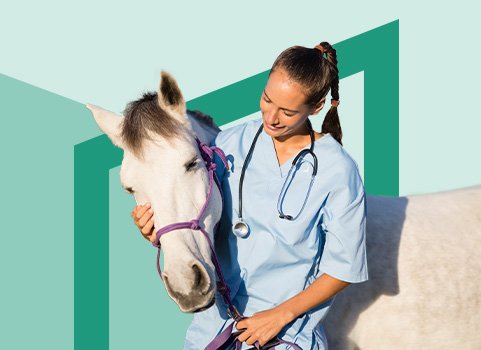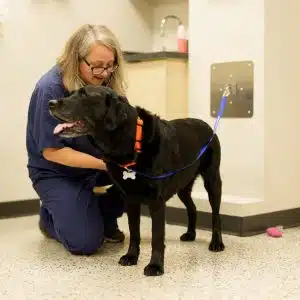Veterinary Oncologist explains frequent care approaches for canine cancer
Comprehensive Overview to the Solutions Provided by a Veterinary Oncologist
Vet oncology includes a broad selection of solutions targeted at dealing with and detecting cancer in family pets. Veterinary Oncology Services. Oncologists employ sophisticated analysis strategies and provide various treatment choices tailored to every pet's demands. They likewise prioritize helpful care and give important sources for pet dog owners. Comprehending these solutions is essential for making educated choices. What details facets of veterinary oncology can significantly affect an animal's treatment trip?
Understanding Vet Oncology
Vet oncology is a specialized field focused on dealing with and diagnosing cancer cells in animals. This technique incorporates a wide range of techniques, from medical therapies such as radiation treatment and immunotherapy to medical treatments targeted at removing tumors. Vet oncologists are educated to acknowledge the one-of-a-kind symptoms of cancer in numerous types, enabling them to tailor therapy strategies to individual people.
Along with traditional treatments, veterinary oncology stresses supportive treatment, which plays an important role in enhancing the top quality of life for affected animals. This includes pain management, nutritional assistance, and palliative treatment choices. Cooperation with pet dog proprietors is crucial, as they are important to decision-making regarding their pet dogs' therapy courses. As research breakthroughs, veterinary oncology remains to develop, offering new hope and improved end results for pets detected with cancer cells. In general, this field is essential for addressing the intricacies of cancer cells in friend animals.
Advanced Diagnostic Techniques
Advanced diagnostic techniques play an essential function in vet oncology, giving important understandings right into the visibility and degree of cancer cells in pets. Imaging techniques such as ultrasound, CT scans, and MRI are frequently used to visualize growths and assess their characteristics. Furthermore, biopsy treatments are essential for acquiring tissue samples, permitting for conclusive medical diagnosis and customized treatment plans.
Imaging Modalities Utilized
Imaging techniques play an important duty in the medical diagnosis and administration of cancer in pets. Vet oncologists utilize different sophisticated imaging techniques to assess growth transition, existence, and size. Radiography, or X-rays, supplies a preliminary sight of bone and upper body problems, while ultrasound offers real-time imaging of soft cells, enabling in-depth assessment of internal organs. Calculated tomography (CT) improves visualization of complicated anatomical frameworks and enables 3D repairs, assisting in specific lump localization. Magnetic resonance imaging (MRI) is vital for soft tissue differentiation, particularly in brain growths. Additionally, nuclear medicine methods such as positron discharge tomography (FAMILY PET) assistance identify metabolic activity within tumors. Collectively, these methods enhance diagnostic accuracy, directing reliable treatment strategies for oncological patients.
Biopsy Treatments Discussed
Following the initial assessment via imaging methods, acquiring a conclusive medical diagnosis often calls for tissue tasting via biopsy treatments. Veterinary oncologists use different biopsy methods based upon the lump's place and qualities. Fine needle ambition (FNA) is a minimally intrusive technique that draws out cells for cytological examination, perfect for superficial masses. Core needle biopsies offer larger cells examples and serve for deeper lumps, enabling histopathological analysis. Surgical biopsies involve excising a part or the entire growth, assisting in comprehensive assessment. These treatments not just validate the presence of cancer yet additionally assist identify its kind and quality, guiding treatment decisions. Each biopsy technique is chosen carefully to stabilize analysis precision with individual security and convenience.
Therapy Choices for Cancer in Pet dogs
When a pet is identified with cancer, a range of therapy alternatives become offered to help handle the illness and improve quality of life. Vet oncologists commonly advise a multidisciplinary approach tailored to the private animal's demands, which may include surgical treatment, radiation therapy, immunotherapy, or alternative therapies.
Surgical treatment is commonly employed to eliminate growths and affected cells, possibly leading to complete remission in some cases. Radiation therapy aims to target and destroy cancer cells, minimizing tumor size and relieving signs and symptoms - Veterinary Cancer Specialist. Immunotherapy utilizes the animal's body immune system to eliminate cancer cells better, while alternate treatments might consist of acupuncture or natural supplements to support general health
Each therapy choice carries its own advantages and threats, and veterinary oncologists function very closely with family pet proprietors to develop a complete plan that lines up with the pet dog's specific diagnosis and the proprietor's dreams. The utmost goal is to enhance the pet's comfort and quality of life throughout their cancer journey.
Radiation treatment for Animals
Radiation treatment is an usual treatment alternative for pet dogs identified with cancer cells and is commonly utilized in conjunction with various other therapies laid out by vet oncologists. This treatment involves the administration of certain medicines designed to target and damage cancer cells, consequently minimizing tumor dimension and protecting against the spread of the disease. Vet oncologists tailor chemotherapy procedures based upon the kind of cancer cells, the pet dog's total health and wellness, and the wanted treatment result.
Negative effects can take place, as these medicines might also impact healthy cells. Usual reactions consist of nausea, throwing up, and short-term adjustments in hunger - Pet Cancer Surgery. Vet oncologists are equipped to manage these adverse effects successfully, making sure the animal's comfort throughout the therapy process. Normal monitoring through blood tests and follow-up appointments is important to evaluate the animal's response to radiation treatment and make essential modifications. Ultimately, radiation treatment can offer substantial benefits, boosting the lifestyle for pets dealing with cancer cells medical diagnoses

Radiation Therapy in Veterinary Medication
Radiation treatment functions as an effective therapy choice for pet dogs identified with localized lumps, supplying a targeted technique to cancer monitoring. This technique utilizes high-energy radiation to harm the DNA of cancer cells, hindering their capability to proliferate. It is specifically valuable for lumps that are not open to surgical removal or for cases where surgery may not be feasible due to the growth's location.
Veterinary oncologists customize radiation procedures based upon growth area, size, and type, as well as the pet more information dog's overall health and wellness. Treatment can be provided through exterior beam radiation or brachytherapy, each with distinctive benefits. Commonly, multiple sessions are needed to take full advantage of efficiency while reducing adverse effects.
Although animals may experience short-term responses such as skin irritation, the overall goal is to diminish lumps and minimize signs and symptoms, inevitably enhancing the pet dog's diagnosis and lifestyle. Appropriately, radiation treatment plays a vital role in extensive cancer care.
Palliative Care and Lifestyle
Palliative care in vet oncology focuses on improving the quality of life for family pets facing incurable illnesses, ensuring comfort and dignity in their final days. This specialized technique prioritizes discomfort management, signs and symptom control, and psychological assistance. Veterinary oncologists assess each pet dog's specific requirements, tailoring interventions to relieve discomfort and internet boost general well-being.
Methods may consist of administering medicines for pain relief, managing nausea, and dealing with various other upsetting signs and symptoms. In addition, nutritional assistance is commonly offered to maintain toughness and boost appetite. The psychological element of palliative care is similarly vital; creating a calm environment aids reduce stress and anxiety for both pet dog and proprietor.
Inevitably, the objective of palliative care is to allow pet dogs to appreciate their staying time with as much delight and self-respect as feasible. By concentrating on convenience and high quality of life, veterinary oncologists play a crucial role in ensuring that animals and their family members browse this challenging journey with empathy and understanding.
Assistance for Pet Owners During Therapy

Emotional Guidance for Owners
Charting the emotional landscape during a family pet's cancer treatment can be a frustrating experience for owners. The unpredictability surrounding medical diagnosis and diagnosis can lead to feelings of sadness, stress and anxiety, and vulnerability. Vet oncologists identify the importance of emotional support and often give support to aid proprietors browse this tough trip. Communication is essential; discussing therapy choices and prospective end results can relieve some fears. Furthermore, using peace of mind that psychological reactions are valid fosters an encouraging environment. Numerous oncology centers might additionally recommend assistance groups or counseling services customized for pet dog owners, assisting in shared experiences. Motivating owners to prioritize self-care during this time around is essential, as their psychological well-being directly influences their animal's comfort and total therapy experience.

Resources and Educational Products
Steering with the complexities of a family pet's cancer treatment can be intimidating for proprietors, making access to trusted resources and instructional materials necessary. Veterinary oncologists usually supply a variety of handouts, brochures, and online products that explain treatment alternatives, prospective negative effects, and treatment methods. These sources help debunk the process and empower pet proprietors to make informed choices. Additionally, lots of oncology facilities provide access to support groups and discussion forums where find more info owners can get in touch with others encountering comparable challenges, cultivating a feeling of community. Educational webinars and workshops performed by veterinary experts better enhance understanding, making certain that proprietors are fully equipped to browse their pet dog's journey with cancer cells therapy with self-confidence and understanding.
Often Asked Questions
Exactly How Can I Prepare My Family Pet for a Veterinary Oncology Visit?
Preparing a pet for a vet oncology see entails gathering medical documents, noting signs and symptoms, and guaranteeing the animal is comfortable. A calm behavior and acquainted items can aid reduce anxiety during the consultation.
What Are the Indicators My Animal May Have Cancer Cells?
Indicators that a family pet might have cancer include inexplicable weight-loss, relentless throwing up or diarrhea, uncommon lumps or swellings, lethargy, changes in appetite, difficulty breathing, and alterations in actions. Prompt veterinary focus is vital.
How Can I Assistance My Family Pet Mentally During Treatment?
Sustaining a pet dog mentally during treatment entails offering comfort, keeping routines, providing mild affection, and guaranteeing a tranquil atmosphere. Participating in silent play and routine companionship assists minimize anxiety and cultivates a sense of safety and security.
Exist Alternate Treatments for Animals With Cancer cells?
Alternative therapies for pets with cancer cells include acupuncture, organic therapies, and dietary support. These techniques might match traditional treatments, advertising overall health. Consulting with a vet is necessary for effective and risk-free assimilation of different therapies.
What Costs Should I Expect for Veterinary Oncology Solutions?
The anticipated expenses for vet oncology solutions can differ substantially, usually affected by diagnostics, treatments, and continuous care. Pet proprietors need to get ready for costs ranging from consultations to specialized treatments, showing the intricacy of cancer cells management.
Cooperation with family pet proprietors is important, as they are integral to decision-making regarding their family pets' treatment courses. Each treatment alternative lugs its very own advantages and threats, and vet oncologists function very closely with animal proprietors to design a detailed plan that aligns with the animal's details medical diagnosis and the owner's wishes. Pet dogs may experience momentary reactions such as skin inflammation, the general goal is to reduce lumps and alleviate symptoms, eventually enhancing the pet dog's diagnosis and top quality of life. Support for pet dog owners throughout treatment is vital in guiding with the emotional challenges associated with a pet's cancer cells medical diagnosis. Preparing a family pet for a veterinary oncology browse through includes celebration medical documents, keeping in mind signs and symptoms, and ensuring the family pet is comfy.